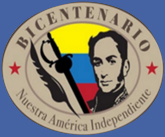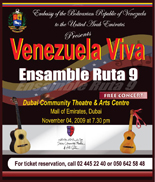
Bolivarian Republic of Venezuela
Embassy in the UAE
Venezuela for kids History Discovered at the end of the 15th century by Christopher Columbus, Venezuela was first called “Little Venice” (hence “Venezuela”) because of the resemblance of the native stilt houses on the edges of Lake of Maracaibo to the Venetian dwellings of the time. Thereafter Venezuela was a Spanish colony for over three centuries until the independence movements sweeping the Americas encouraged Venezuela to initiate its struggle for independence from Spain in 1810. During the years of Spanish rule, Venezuela did not attain the importance of the major viceroyalties centered elsewhere on the continent. Accordingly, during this period the population of Venezuela remained comparatively small with an economy based on a few agricultural crops and a minimum of commercial activities. Following the victorious struggle for independence under the leadership of Simón Bolívar, Venezuela became part of the historical confederation known as the Gran Colombia between 1820 and 1830. In the latter year Venezuela withdrew from the confederation forming the present Republic of Venezuela. The reminder of the 19th century and the early part of the 20th century was filled by internecine warfare, which actually had the effect of decreasing the total population during this century. The economy in this period was based on exports of cocoa, coffee and sugar, plus cattle raising and commercial activity. It was only with the long, twenty seven year dictatorship of Juan Vicente Gómez (1908-1935) that the country was finally under a central government. It was also under Gómez that the economy experienced a dramatic change and the modern Venezuela economy began to emerge. In the early years of the 20th Century, oil became the economy’s basic commodity as well as a strong stimulus to development. The oil and mining industries became the largest contributors to the gross national product and the main sources of foreign exchange. Manufacturing and a more diversified agricultural output have also become significant as economic development has allowed for these sectors’ increased share of the economy. The first concessions were granted in the 1910’s with the first substantial quantities of oil being exported in the early 1920’s. By 1982, petroleum exports accounted for 90% of foreign exchange earnings, which is still the case at present. The Gómez dictatorship was followed by three more governments and early attempts at democratization resulting, in 1948, in the first direct popular election of the Venezuelan president Rómulo Gallegos. The Gallegos government was short-lived and overthrown later that year by a military coup. This led to the dictatorial regime of Marcos Pérez Jiménez, until 1958, when his government was toppled by a popular clamor for a democratic system. In elections held later that year the Social Democrat (AD) party candidate, Rómulo Betancourt, was elected. It was during Betancourt’s administration that programs to stimulate industrialization and the first efforts for development planning were initiated. His administration enacted far reaching programs of agrarian reform and of improvement of the standards of living, particularly in the fields of health and education, that were to become the basis for the transformation of Venezuela. Betancourt’s most important contribution, however, was to consolidate the foundations of democracy in Venezuela. Since Betancourt’s election, and up to the present, Venezuela’s political process has been stable and all successive administrations have been the product of free and democratic elections. The Betancourt government was followed by the administration of Raúl Leoni, also a social democrat, until 1968 when the Christian Democrat (Copei party) Rafael Caldera was elected to office. In 1974 the government shifted back to the AD party with the inauguration of Carlos Andrés Pérez, who in turn was succeeded in 1979 by the Copei candidate Luis Herrera Campíns. In 1983 the Social Democrats again returned to office and Jaime Lusinchi was elected President for the period 1984-1989. In 1989, Carlos Andrés Pérez was again sworn into office. His term expired in 1994. Rafael Caldera, won the 1994-1999 elections supported by a coalition of 17 political parties. Hugo Chávez was inaugurated on February 2, 1999. His Presidential mandate was reconfirmed through elections that took place on July 30, 2000 for a period of six years. Venezuela has now enjoyed almost 50 years of free democratic government.
|








